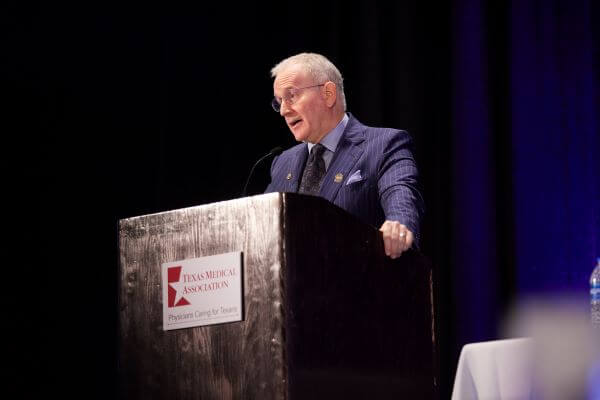
When Floresville pediatrician Charlie Morehead, MD, decided to transition away from hospital employment to private practice post-pandemic, she felt she had done a good job of getting her practice established. "But I needed to learn how to make it grow."
Her husband, Adkins general surgeon Preston Morehead, MD, also wanted to learn to support his wife's practice. And even as an independent contractor, he knew legislative changes at the state and federal level – like the No Surprises Act – would affect him, too.
That's why the duo signed up for their first-ever TMA conference, which focused on the business of medicine. And the experience delivered.
"We learned a lot. And there were a ton of [TMA] benefits we didn't realize," Dr. Preston Morehead said.
The couple have been TMA members since they were medical students, and Dr. Charlie Morehead admitted they often asked themselves why they were paying dues.
"After this [conference], we will never ask that question again."
The new conference-goers were among 600 attendees at last weekend’s inaugural Business of Medicine Conference who enjoyed a cohesive agenda and focused CME to untangle new issues in health care delivery, insurance, and technology.
The timely education on pressing issues in medicine, coupled with fresh opportunities to connect with colleagues, were especially helpful for first-time TMA conference attendees, a group that comprised about half of all registrants.
With more than triple the CME courses compared with last year’s counterpart, Fall Conference, Business of Medicine successfully served its goal of helping physicians navigate health care confidently and competently.

Why a Business of Medicine Conference? “While medicine is a science, and healing is an art, health care is a business. … We as organized medicine are here to help meet those needs not being met in the physician practice model,” TMA President Rick Snyder, MD, said in his remarks at the opening general session, Preparing Physicians for the Future. That physician and industry expert panel explored direct contracting as an opportunity for independent physician practices to reclaim autonomy and financial health amid market forces like insurance industry consolidation.
The conference’s opening and closing general sessions – the latter of which delved into TMA’s 2023 legislative wins and the impact for physician practices – were among the best-attended over the three-day event at Hyatt Lost Pines in Bastrop.

“We have nobody in heaven or on Earth looking out for us as physicians. I am grateful to TMA for looking out for us,” Simone Scumpia, MD, an internist from Austin, said at the closing session.
Also remarkably well-attended was the standing-room only CME session ChatGPT and AI: Ways to Integrate into Patient Care. Family physician Priya Kalia, MD, joined by TMA’s assistant vice president of health information technology Shannon Vogel, shared her insights on using ChatGPT for eliminating practice hassles, building on experiences she shared in this month’s Texas Medicine.
Business meetings also tend to feature state officials TMA may work closely with, in this case Department of State Health Services Commissioner Jennifer Shuford, MD, and Medicaid Director Emily Zalkovsky.
“Physicians across Texas are our valued partners; they help us accomplish our public health goals,” Dr. Shuford said.
Physicians at all points in their careers and across specialties and practice types also lauded CME that helped untangle sticky legal issues facing medicine, such as Navigating Non-Compete Clauses with TMA consultant Amanda Hill, JD, and No Surprises Act – What’s the Impact on Your Practice?, presented by TMA’s vice president of medical economics, Robert Bennett.

The real-world implications of the conference’s focused topics fostered constructive conversation and collaboration between physicians, providing practical benefits and creating and strengthening the peer-to-peer relationships TMA hopes to build with in-person conferences. This extended to building relationships between physician members and association staff, facilitated through the return of Small Talks Coffee Breaks, which educate members on TMA resources.
And conference wasn’t all business: Kicking off with Thursday evening’s lively pickleball pick-up game, attendees were given opportunities to connect with and meet peers, specifically scheduled not to conflict with the conference’s compelling CME and business schedule. Friday’s Networking Happy Hour and All-Conference Mixer followed, along with a networking lunch.
TMA’s next conference will be its Leadership Summit, Jan. 25-27 in Austin. Save the date and read Texas Medicine Today for program updates and developments in weeks to come.